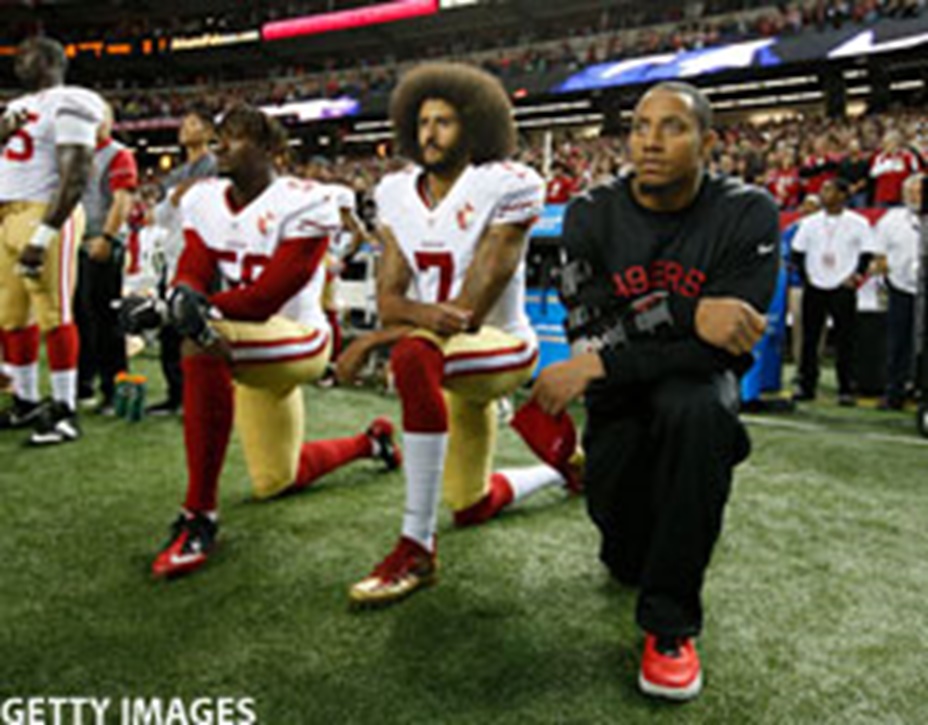Colin Kaepernick's protest against police brutality has "grown into a roar with hundreds of players sitting, kneeling, locking arms or remaining in locker rooms," but their reasons for demonstrating are as "varied as their methods," according to Holland & Haines Whack of the AP. Despite the increased participation, fans "rallying to defend players or decry the protests aren't talking about police brutality." The discourse now has "morphed into a debate over the First Amendment, [President] Trump's insults, how much the NFL has been paid by the U.S. government for its displays of patriotism and the overall state of race relations in America." Some worry that the "expanded reasoning for the protests" could "dilute the passion and the permanence of its original cause, drawing attention to interactions between police and minorities" (AP, 9/26). Bears CB Prince Amukamara said that more attention "should be paid to precisely why players are protesting during the national anthem." Amukamara: "What Trump did was, he tried to make it about him, and really it’s not. It’s just about social injustice and inequality, and I think we’re all just hoping that message stays pure" (CHICAGO SUN-TIMES, 9/27). Titans WR Rishard Matthews: "Moving forward, I don't want this to be a publicity stunt. ... I don't want to take away from what the whole protest is about, which is oppression, police brutality and inequality in this country" ("NFL Live," ESPN, 9/26).
WATERING DOWN THE MESSAGE: In DC, Jamil Smith writes under the header, "How The NFL Watered Down Colin Kaepernick's Protest." The NFL last weekend "took an opportunity to throw its weight to aid the cause of racial justice and turned it into a bland exhibition of corporate 'unity.'" What began with Kaepernick taking a knee for a specific purpose "mutated into generic displays bereft of any meaningful message." The images of team owners "needling their way" into locking arms with players "serve to dilute the specific meaning of Kaepernick’s protest." Even if these players linking arms are "down for the cause, they put themselves out there to be packaged by a league that has never truly embraced Kaepernick’s movement, as their bosses sell the brand instead of calling for justice" (WASHINGTON POST, 9/27). SI.com's Jonathan Jones wrote players linking arms with one another was the "most common protest" over the weekend, but was also the "least effective -- if you can even call it a protest." Linking arms presents a "faux show of unity that promotes the ideal that we [are] one, that we are all treated the same and that we’re all in this fight together." If anything, the linked arms "appear to be a sign of solidarity" against Trump. However, Kaepernick’s protest "isn’t about Trump or the flag but about racism and inequality; Trump perverted this to make it all about him" (SI.com, 9/26).
MAKING PROTESTS MORE ACCEPTABLE: In DC, Kevin Blackistone writes Jaguars Owner Shahid Khan set a "bad precedent" when he became the first team owner on Sunday to stand arm-in-arm with his club. What Kaepernick began during the '16 preseason as a protest "against the unchecked extrajudicial killing of black men in this country was co-opted by mostly white owners into dinner theater that everyone could digest." It all but "usurped the message of the Black Lives Matter movement, which is the foundation" of Kaepernick’s demonstration. It "made protest, which is supposed to make people prickly, palatable, instead" (WASHINGTON POST, 9/27). In Toronto, Morgan Campbell writes, "If the goal was ambiguity, NFL team owners nailed it." The gestures "showed enough support for protests to keep players onside, but by emphasizing amorphous concepts like unity they derailed yet another oncoming, uncomfortable confrontation with racism." Campbell: "All we have is unity dressed up as progress but protecting the business" (TORONTO STAR, 9/27).




